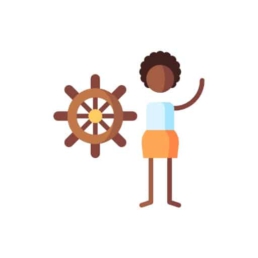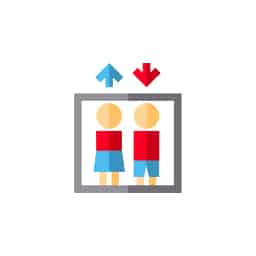Ensure Your Success as an Entrepreneur or Small Business Owner with These Skills
If you’re starting your own business, you may call yourself by a number of names like small business owner, entrepreneur, founder, solopreneur, freelancer, or contractor. Regardless, building your own enterprise from the ground up is a job for risk takers and hard workers.
Despite the pandemic, Americans are embracing entrepreneurship like never before. In fact, there were more than 1.5 million new business applications in the third quarter of 2020 – double the amount during the same period in 2019.
LinkedPhone serves the small business community with local & toll-free business numbers that work with your cell phone, desk phone, & laptop. Add a 2nd phone number to your cell phone with our mobile app. Talk & text with clients on the go. Add team members too. Finally break free from the desk phone. At LinkedPhone, freedom rings! 🔔📱💻☎️
If you’re a new business owner, or a tenured veteran, you’ll need a few top skills. Don’t worry too much if you struggle with some of these. Instead, dedicate time to learning and constant improvement through practice and education.
-
- Communication
- Resiliency
- Tenacity
- Networking
- Sales
- Software competency
- Time management
- Money management
- Leadership

Communication
It doesn’t matter how great your product or service is if you can’t communicate their value, whether that’s through an elevator pitch, value proposition, or your company’s vision for the future. This includes everything from explaining what you do to an acquaintance at a party to writing persuasive emails. Business is about building relationships with clients, partners, and prospects and requires you to sell your business in direct and concise ways.
Communication is also important when setting expectations and problem solving. Before signing an agreement with a client, or selling your service, communicate the scope of your offering, costs and time frames, and what your business is responsible for (and just as importantly, not responsible for.) Inevitably, you’ll have a customer who is unhappy with their purchase. To solve this problem, you’ll need to actively listen to their concerns and formulate a plan to resolve their issue.
Ways to Improve Communication Skills
-
- Pay attention to nonverbal cues like body language, eye contact, and facial expressions.
- Don’t make assumptions about what your listener already knows.
- Be mindful of using industry buzz words or corporate jargon that your audience may not understand.
- Sometimes, it’s worth explaining some basics before diving into the rest of the conversation.
- Ask questions. When speaking with a potential client, practice asking discovery questions that can help you better serve their specific needs. Sometimes people have a problem but don’t know what solutions are available; discovery questions set you up as a consultative expert.

Resiliency
Not everyone is going to understand your vision and it may take a while to hone in on your target market. People say no to purchasing items and services for a number of reasons like price, resistance to change, thinking they can do it on their own, and competition. Ask any salesperson and they’ll tell you that it’s okay when a customer says no because now you have more data to improve your business and move forward.
Business Growth Toolkit
Get the latest thought leadership insights on growing your business plus occasional LinkedPhone updates. We respect your inbox!
Ways to Improve Resiliency
-
- Reflect on your experiences. View setbacks as opportunities to learn, not as threats to your business.
- Practice mindfulness and effective stress relief like exercise, meditation, and making time for friends and family.
- Stick to your plan. If you encounter a setback, don’t immediately scrap your strategy. Instead, modify it with the new information you’ve learned.
- Take care of your health. Proper sleep, diet, and exercise help us handle stress and keep an optimistic outlook.

Tenacity
Also known as determination, persistence, and perseverance, tenacity is having the courage to stay strong when you encounter hardship. Entrepreneurs start their businesses because they believe in the value of what they have to offer the world. And the only way to realize that vision is to come up with and execute on creative ways to get the first customers through the door with tenacity.
Athletes, artists, and politicians all have a drive to keep moving forward and not give up on their long term goals. Part of that comes with having a passion for your work and seeing opportunity in adversity.
Ways to Improve Tenacity
-
- Set goals that you can measure and breakdown into milestones. You may want to be the leader in your industry but without a plan on how to secure your first client, grow your customer base, and differentiate yourself from your competitors, you have no path to get there.
- Study your field. Entrepreneurs are all competing against other businesses. Even if you don’t have a direct competitor, there are still companies that say they can solve the same problems you do, albeit in a different way. Follow leaders on social media, read PR releases, and study their go-to-market strategy.
- Find supportive people in your life that are driven to accomplish their goals. Sharing inspiration and energy can help you stay motivated.
- Review your accomplishments on a regular basis. What have you achieved in the last year? What have you learned? How have you improved?

Networking
All business is social. Even if you build robots or design websites, you still need to network and meet like minded folks. Networking is an important way to learn and gain insight into how others combat similar problems. For many entrepreneurs, networking brings them referrals that help grow their businesses.
The more known you are in your professional community, the more publicity you’ll see for your work. Attending networking events can also improve your communication and sales skills by offering opportunities to practice.
How to Improve Your Networking Skills
-
- Attend local networking events. Look for broad areas of interest and people who you can learn from. There are dozens of events happening at any time in your area, as well as online.
- Join LinkedIn and connect with people who are doing interesting things. Find meetup groups in your city based on your industry (or even your personal hobbies).
- Ask questions when you meet new professionals. Show an interest in what they do and have to say. It’s not just about what you’re getting from them. Every interaction is a learning activity and every contact is a potential customer or referral.

Sales & Marketing
Selling is hard and takes a lot of practice. Luckily, you can train yourself and your employees to be excellent salespeople. Running your own business requires constant outreach, whether through personalized emails and messages or through marketing on social media or local TV ads. A business can’t just wait for customers to come to them.
How to Improve Your Sales Skills
-
- Have a sales strategy. Maybe it’s calculating how much money you need to fundraise to expand your business within two years.
- Practice your elevator pitch – a short explanation of what your business does and how it helps your customers.
- Create a value proposition – who are your customers? What do you do? How do you do it? And why do you do it?
- Be comfortable with cold calls and other forms of outreach to grow the business

Software Competency
Running a business requires the use of business software for things like bookkeeping, sales tracking, delivery management, and virtual business phones. No longer can an entrepreneur scale their business in ledgers and excel files.
The sheer number of options available can be daunting and you may not need the latest software, or any software, for every part of your business. But having critical tools to manage your sales and customer relationships can help you improve your communication and time management. If you have employees, payroll is another crucial application you shouldn’t neglect.
How to Improve Your Software Competency
-
- Understand the mobile app and SaaS software landscape to know which tools are best able to support the business.
- If social media marketing is part of your sales strategy, you'll need to understand how each platform works and how to target the right audience.
- If you’re not technically savvy, learning new tools can be pretty scary. Luckily, there are plenty of low cost or free software options perfect for small businesses.
- Take an online course on how to use office software on sites like Coursera or Khan Academy.
- Check out your local library website. Most libraries offer programs that help students learn everything from basic computing skills to website design.

Time Management
Time management is perhaps one of the most challenging skills for busy entrepreneurs. When you have a growing company, your attention is pulled into many directions every day. Focus and clear time management can help you accomplish important projects and tasks first, then move on to other activities.
How To Improve Your Time Management
-
- Work on a schedule. Have a to-do list and prioritize your most important activities and tasks.
- Clearly identify deadlines. A customer deadline should be a higher priority than other office tasks that are not urgent.
- Set boundaries. It’s easy to say yes to every opportunity that comes your way, but if it doesn’t directly correlate to your business goals, be prepared to say no.

Money Management
Finance and bookkeeping are system critical to running a business. Running out of cash is one of the main reasons small businesses fail. But don’t worry, there are tools and resources available to help you improve your finances and plan ahead.
How To Improve Your Money Management Skills
-
- Consider hiring a bookkeeper to reconcile your budget on a monthly basis. In the United States, self employed workers need to file taxes on a quarterly basis. An accountant can help manage this process as well as your year end tax filings.
- Instead of a bookkeeper, or in addition to, invest in accounting software like Quickbooks or Freshbooks. These are affordable software programs that can track things like accounts payable and receivable as well as manage invoicing, bank account balances, and even payroll.
- Include payment terms in your client contracts for services. This will help you dispute clients who don’t pay their bills by having a written agreement in place.
- Track your expenses and make use of tax deductions and tax credits. There are a number of tax incentives in the US for small businesses that are struggling due to the pandemic.

Leadership
Last, but definitely not least, entrepreneurs must be prepared to take on the mantle of leader. An effective leader can increase morale, drive the company forward, and bring out the very best in their employees. Leaders must also understand how to build out their teams and whether hiring full-term employees or part-time freelancers makes sense for the business.
Many of the skills covered in this article are important to leadership. Communication and the ability to give and receive constructive feedback, will help you build improvement into the DNA of your business. Tenacity and resiliency show your employees that you’re prepared to address problems that come your way with confidence.
How To Improve Your Leadership Skills
-
- Develop your self awareness. No one is perfect, and leaders aren’t expected to be. But they are expected to own their mistakes and take responsibility. Think about your strengths and weaknesses as a business owner and ask for help on improving.
- Invest in your soft skills. You may be a phenomenal chef or software engineer but empathy and active listening are the skills that build customer loyalty. Lead through example and create a creative and collaborative environment.
- Find a mentor, another leader that you admire and that can teach you how to navigate the grey areas of management.
- Set realistic goals and expectations for your employees. Don’t push them to accomplish something in too short of time; they’ll experience burn out and may leave for other opportunities.
- Keep up to date by reading the latest business books and business & marketing podcasts.
- Join an online forum for entrepreneurs and small business owners to learn from others who have gone through the same journey.
Start Building Your Entrepreneurship Skills
Entrepreneurs chase their dreams – and those dreams are big. Prepare for success by building constant improvement into your daily routine. Expand your network, improve communication, and work to show resilience in the face of adversity. Don’t worry if you’re not nailing all of these skills today, the important thing is that you’re willing to learn.
Small Business Resources
A special high five to Tahera Ali Khan for her outstanding research and contributions to this article. We love working with and supporting like-minded entrepreneurs. Thank you Tahera! ❤️
Get In Touch
We would love to hear from you.
Please contact us at any time with questions or feedback.
























